The World's Biggest Village |
 |
<<Click to see original |
It comes as no surprise to anyone who has actually visited the Bavarian capital that Munich has once again become the most favoured destination in Germany for visitors from the Gulf region.
The city's motto is "München mag Dich" (Munich Loves You) – an apt slogan as official figures just released from the Munich Tourist Office show an increase of 22% in visitors from GCC countries compared with the previous year. It’s not hard to see why. There are plenty of sights to see and things to do in this historic metropolis that is home to 1.3 million people.
Munich offers a unique combination of modern flair and traditional charm, all mixed together with a heavy helping of Gemütlichkeit, that special German term for hearty, healthy togetherness! The city has loads of great museums, art treasures, hi-tech industries and gems of Gothic and Baroque architecture. It is also the gateway to the Bavarian Alps, drawing winter sports enthusiasts from near and far.
Munich itself was founded in 1158 on the River Isar, and acquired its name – München - from the monks (Mönche) of the Benedictine order who founded the city; hence the monk depicted on the city's coat of arms. Black and gold—the colours of the Holy Roman Empire—have been the city's official colours ever since.
It was the monks who started the brewing tradition for which the city is now world famous, particularly since it started celebrating its annual Oktoberfest in 1810; and Munich must surely be the only airport in the world that has its very own brewery!
In fact Munich’s airport was recently voted best airport in Europe for the fifth time. It recently celebrated its 18th birthday and figures show that during this period 5.7 million flights and 416 million passengers have used the visitor-friendly facility. Not here will you find the impersonal vastness, that is so typical of the likes of Frankfurt airport. Munich Airport even boasts Europe's largest glass-roofed open space between Terminals 1 and 2 where you will find volleyball courts in the summer, a polo arena, regular art exhibits and a number of events staged throughout the year.
Most Munich residents enjoy a high quality of life with the city regularly amongst the top 10 cities in the world in this regard. But Munich also ranks as the world's 39th most expensive city to live in and the most expensive major city in Germany. Its thriving economy is driven by the information technology, biotechnology and publishing sectors, whilst the headquarters of BMW, situated on the edge of the Olympic Park, are synonymous with the city’s reputation for luxury and sophistication.
Munich, it appears, has gone out of its way to welcome Arab travellers. Plenty of luxury hotels employ Arabic-speaking staff, offer special halal menus and reserve entire floors for their regular visitors from the Gulf region, who are expected once again to flock to Munich in high numbers this year, during the summer months. They are particularly drawn by Munich’s great shopping opportunities, its historical architecture and the myriad parks and gardens scattered across the city. The green countryside surrounding Munich with its beautiful lakes and castles also draws thousands of people each year to enjoy the fresh summer climate of southern Germany.
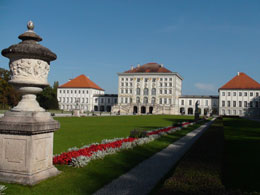
Neuschwanstein Castle, for instance, is located close to Munich. First open to the public in 1886, the "fairytale castle" of King Ludwig II continues to draw over one million visitors a year, including many visitors from the GCC region who decide not to miss out on this integral part of a unique ‘Bavarian experience’.
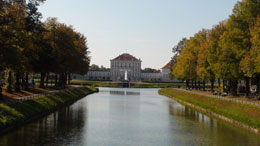
Closer in to town are two large baroque palaces at Nymphenburg and Oberschleissheim - reminders of Bavaria's royal past. Schloss Nymphenburg, some 6 km north west of the city centre, is surrounded by an impressive park and is considered to be one of Europe's most beautiful royal residences.
There’s no doubt about it that Munich is a very green city. In fact, during the summer months, life seems to revolve around the outdoors. Everywhere are street cafes, and everyone appears to be biking or hiking at the weekends. The largest park, the Englischer Garten (English Garden), is bigger than New York's Central Park or London's Hyde Park. People go there to play, picnic or hang out.
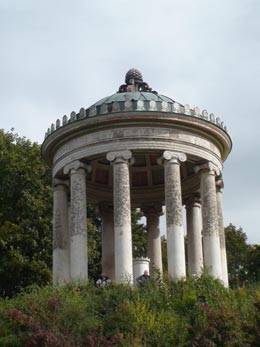
Whatever the weather, the neoclassical Monopteros is a panoramic vantage point, and the Chinese Tower is a popular meeting place.
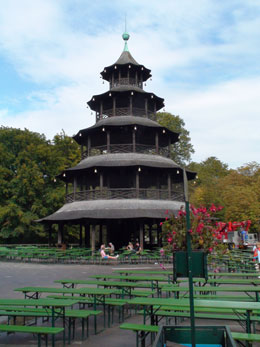
The Germans call Munich the world's biggest village, but in reality it's easy to find your way around. Many older buildings in the medieval Altstadt have been painstakingly restored, following heavy bombing of the city during the Second World War. This inner city has even been recreated in the virtual world of ‘Second Life’ and can be visited via the Internet for a virtual sight seeing tour.
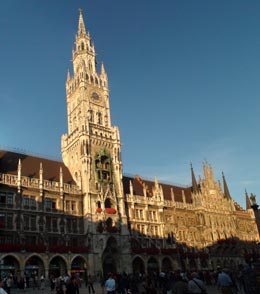
At the centre of the city is the Marienplatz—a large open square named after the Mariensäule, a column in its centre. Its main building is the Town Hall with its 85 metre high tower, built at the end of the 19th century in Gothic style. Its carillon with 42 bells and 32 copper statues comes alive at noon and five every day and is one of the city’s main tourist attractions. Three gates of the demolished medieval fortification have also survived to this day—the Isartor in the east, the Sendlinger Tor in the south and the Karlstor in the west of the inner city.
Four grand royal avenues of the 19th century with magnificent official buildings connect Munich's inner city with the suburbs; but although most of the main landmarks are within the ring road that hugs the route of the old city wall, it's well worth venturing beyond the largely pedestrianised central zone.
With the Alps just a stone's throw away, there are many possibilities for outdoor sports, such as paragliding, hiking, mountain climbing or mountain biking during the summer months.
Last October, the International Olympic Committee listed Munich as one of the three Applicant Cities for the 2018 Winter Olympic Games. If chosen, Munich will be the first city ever to host both the Summer and Winter Olympic Games.
The Müncheners themselves are convinced that the charms of their city are simply irresistible!
